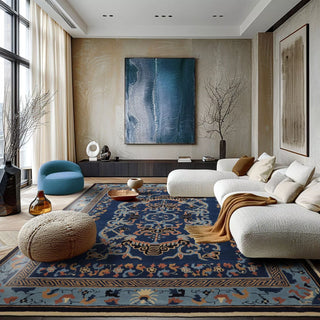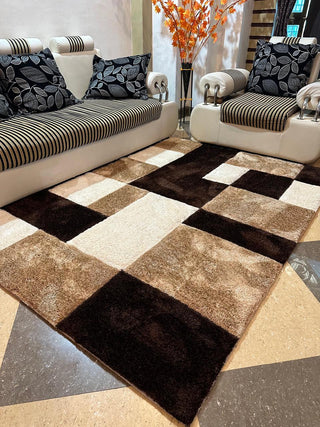When it comes to finding the perfect carpet for your space, there are two main avenues to explore: opting for a ready-made piece or investing in a custom creation with expert guidance. Each path has its own set of advantages and drawbacks, necessitating careful consideration before making a decision.
In this quick guide, we’ll shed light on both options, whether to buy custom carpet or go for a readymade carpet.
Choosing Ready-Made Handmade Rugs
If you're looking to save time and money, opting for a machine-made carpet can be a practical choice. This option is especially convenient for those undergoing a quick space redesign for an event or special occasion. With a plethora of options to buy carpet online and in retail stores, you can easily set a budget, select a design, coordinate colors with your furniture and decor, and arrange for delivery at your convenience.
Usually, a machine-made carpet does well in projects that involve extensive furnishing across multiple spaces, offering a diverse range of styles. Whether you want a modern touch in the living area or prefer traditional pieces in the dining room and kitchen, the variety is at your fingertips. Moreover, when looking to buy custom carpet, you can explore various color combinations and sizes and even choose the type of rug material, catering to specific preferences such as allergies or pet-friendly considerations.
Things to Consider Before Opting Between Ready-Made and Machine-Made Carpet
If you’re willing to buy custom carpet, then ensure that you’ve already done the homework. It requires thoughtful consideration of various factors tailored to the specific needs of each area within your project. Whether it's heavy traffic zones, open-plan areas demanding extra acoustic control, or spaces requiring 24/7 accessibility for cleaning – every aspect matters.
Commercial carpets undergo rigorous testing and classification based on their suitability for different end uses. Understanding these classifications empowers you to collaborate effectively with your custom carpet supplier. Consider factors like backing materials and cushioning types, as they significantly impact underfoot comfort, longevity, appearance retention, and acoustics. A consultation with your supplier will help you make informed decisions in this regard.
Thanks to advancements in dye-injection technology, aspirations to buy custom carpet and carpet tiles are now more accessible and cost-effective than ever before. Your only constraints are the project budget and your creativity. When it comes to color, design, and pattern choices, the versatility of a machine-made carpet as a design tool opens up a world of exciting possibilities. However, factors like space lighting and the need to conceal soiling in high-traffic areas may influence your choices.
Opting for Custom Handmade Rugs
For those who dislike online shopping or lack the time to visit multiple carpet stores, the decision to buy custom carpet can be a tailored solution. The appeal extends beyond saving time and energy; bespoke rugs empower you to design your space exactly as you envision it. Say goodbye to concerns about matching colors and fabrics with existing furniture – customization allows you to stay true to your vision without compromise.
While the process of crafting a machine-made carpet may sometimes take time, it grants you the flexibility to focus on other aspects of your design project while anticipating its arrival. machine-made carpets are particularly suitable for new homes or complete makeovers, providing carte-blanche authority to implement your design ideas. They can also be an excellent fit for modern spaces that demand a touch of edge and uniqueness.
However, a common apprehension among interior designers and homeowners willing to buy custom carpet is the potential to overspend. To address this concern, it's crucial to find an expert carpet manufacturer such as Carpet Planet who can guide you through the customization process. This involves selecting the right fiber, determining dye colors, and maintaining control over every crucial element. By doing so, you not only establish a reasonable budget but also ensure that your investment aligns with your specific needs and preferences.



